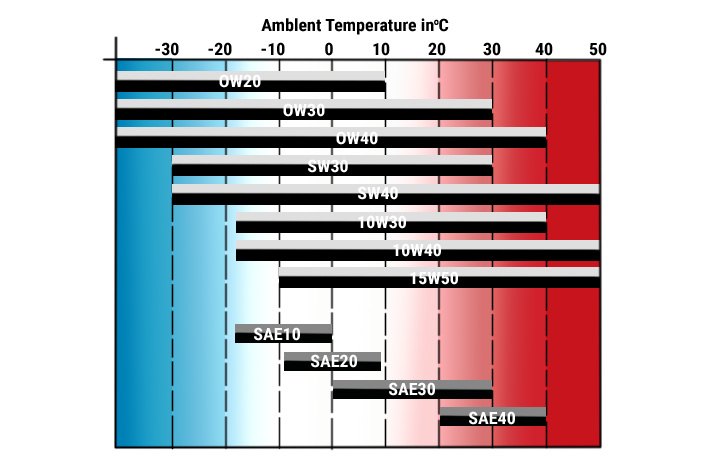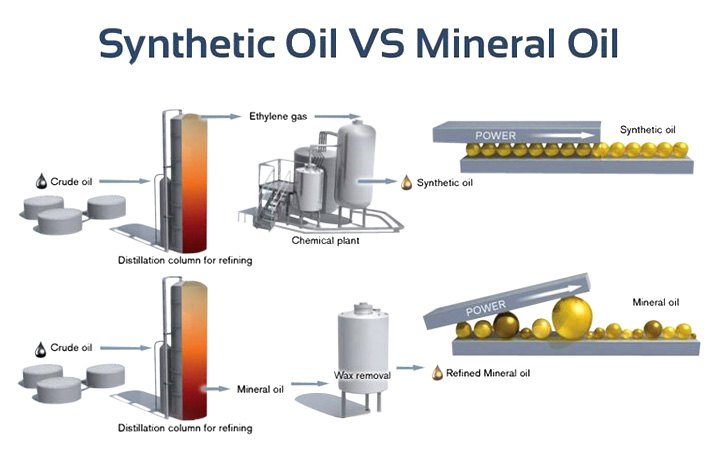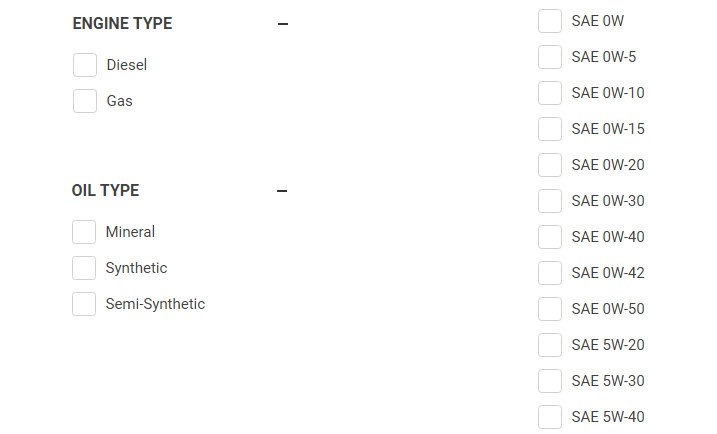Motor oil viscosity is generally known as a measurement of thickness. But more specifically, viscosity determines an oil's resistance to flowing in liquid form as well as its resistance to shearing (breaking down) as it's slammed around inside an engine. In this article, we'll discuss why viscosity is important to you by taking looking at the characteristics of viscosity and how it relates to motor oil.


When defining "viscosity", it's important to note that viscosity of oils will typically fluctuate based on temperature. Any kind of syrup is a good example because it has a high viscosity at cold temperatures - making it thick and difficult to pour. Heat that same syrup up, and it becomes a low viscosity oil that's thinner and runnier. For comparison, water has a low viscosity that remains constant.
Lower viscosity motor oil is easier to pump through narrow orifices and filters, and it will drain down to the sump faster for recirculation. The down side of lower viscosity is the protective film of oil cannot support as much weight and pressure in critical areas such as crankshaft bearings.
Multi-Grade Motor Oils
Regardless of viscosity level, motor oil also thins out as it gets hotter - something that poses a challenge to engineers. To be effective, motor oil must be thin enough to flow easily during cold engine startup, yet it must remain thick enough at higher temperatures to protect moving parts.
Before multi-grade oils were developed, the use of a different viscosity motor oil for each season was the norm. Thinner motor oil with a single viscosity rating of 5 was recommended for winter use, while heavier weight oil with a 30 or 40 viscosity rating was specified for warmer temperatures. As you might imagine, none of these single-grade oils provided the ideal protection that modern oils do - and only added to the time and expense one needed to invest in a vehicle's upkeep.
To create cold-thin and warm-thick characteristics which run exactly the opposite of oil's natural tendencies, modern multi-grade oils contain a range of polymers that expand with heat. Such polymers do not actually thicken the oil itself. What they do is reduce the rate at which everything thins out when heat levels increase.

Multi-grade oils are given a two-part viscosity rating, as determined by the Society for Automotive Engineers (SAE). The first number is the natural thickness of the base oil itself - it's viscosity during cold starts. A "W" in between the two numbers signifies suitability for winter use because uniform standards have been met for certain temperature ratings (based on that first number) for cold cranking and cold pumping. Thus, a 5W-20 weight oil offers the same cold start protection as 5W-30 or 5W-40 oil does.
The second number after the W refers to the viscosity characteristics a motor oil exhibits at 212 degrees Fahrenheit (100 Celsius) - running temperature for most engines. At that point, 5W-40 provides the same protection as 10W-40 or 15W-40.

Characteristics Of Motor Oil
We now know that viscosity refers to the ability of motor oil to flow. Going a level further, viscosity really comes down to the size of the molecular structures within the oil itself. Because those structures will vary in size in naturally-occurring mineral (non-synthetic) oil, the average size of the molecules ultimately determines overall viscosity rating.
As the miles go by, mineral oil molecular structure and size diminish as those molecules literally wear down. Millions of trips around the engine take their toll, leading to particles that are smaller, with less viscosity.

Because synthetic oil is man-made in a laboratory, the molecules produced are uniformly sized. This uniformity allows them to maintain their size and viscosity much longer. That's the main reason synthetic oil doesn't need to be changed as often.
Another trade-off when it comes to viscosity is its relationship to power-robbing friction. A lower-viscosity oil that's thinner and moves easier will create less drag on reciprocating parts as they travel. Reduced drag translates directly to higher fuel economy, and more power at the wheels. The right balance must exist between engine protection and friction reduction.
Know Which Oil Your Vehicle Manufacturer Recommends
Automotive engineers spent painstaking hours testing different grades of motor oil to determine which one works best in your engine. Since their final decision was based on clearances between parts, rpm range, operating temperatures, and other crucial details, using the exact oil they recommend is essential to long engine life. And if synthetic motor oil is specified, use only that.

You'll find the recommended oil in owner manual "Specifications" sections. If a manual isn't available, look for manufacturer stickers that may be placed under the hood. In some cases, viscosity details may be right on the OEM oil filler cap. If all else fails, a call to your vehicle manufacturer will provide the information you need.
Motor Oils We Offer
In the motor oils section of our website, you'll find a wealth of choices. Check boxes along the left-hand column allow you to narrow your search by engine fuel usage, oil type (mineral, semi-synthetic [blend], or full synthetic), and viscosity. This makes it extremely easy to find the exact weight of multi-grade oil specified by your vehicle manufacturer.

Note that if you're looking for hard-to-find synthetic varieties such as 0W-40 or 10W-40, we've got them from Royal Purple.

We've also got single viscosity oils in SAE 30-, 40-, 50-, 60-, and 70-weight varieties. These are ideal for machinery as well as running in newly-rebuilt gasoline engines for a short break-in period.
And if you're looking for a motor oils tailored for racing applications, we've got a selection of synthetic viscosities from Champion, Driven, Royal Purple, Motul USA, Mobil 1, Torco, and more.
Let's repeat our most important point: when buying oil, you should select the viscosity grade recommended by your vehicle manufacturer. Your vehicle's age, its mileage, and your driving conditions all play a role in deciding among mineral or synthetic oils and brands. Be assured that our range of choices means you're guaranteed to find the right motor oil at the right price!

